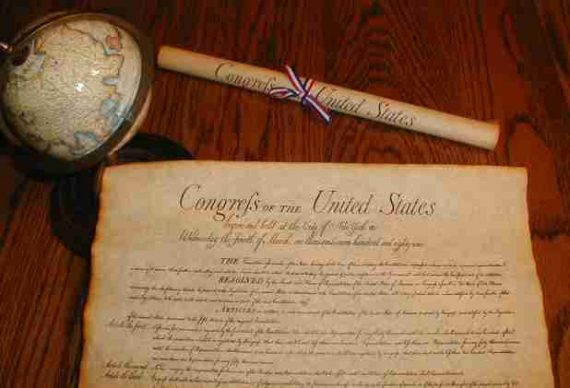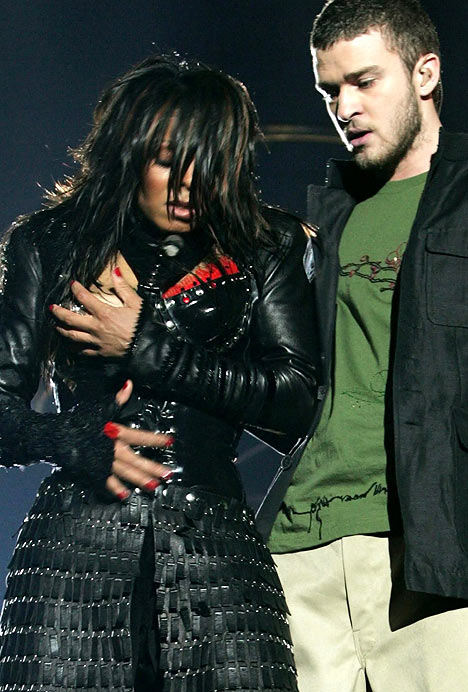Federal Court To FCC: Indecency, F**k Yeah !
A common sense decision on broadcast "decency" standards was handed down by a Federal Appeals Court today.
A Federal Appeals Court has struck down a Federal Communications Commission rule that allowed the agency to fine broadcasters if even a single “dirty word” was uttered in a live program:
A federal appeals court struck down the Federal Communications Commission’s indecency policy Tuesday, saying the agency’s efforts to restrict the use of vulgar language on air were “unconstitutionally vague.”
The decision was a major win for Fox Television, NBC Universal and other broadcasters who have complained that an FCC crackdown on fleeting obscenities was unfair and violated their First Amendment rights.
A three-judge panel of the U.S. Second Circuit Court of Appeals agreed, saying the FCC’s indecency policies were “unconstitutionally vague, creating a chilling effect that goes far beyond the fleeting expletives at issue here.”
The 32-page ruling was laced with many of the words FCC policy said broadcasters could not allow to be spoken on air. It sets up the possibility that the Supreme Court could be asked to revisit rulings that have formed the basis for government curbs on “indecent” broadcast speech, including a 1978 decision that allowed the FCC to fine the Pacifica Foundation for broadcasting a monologue on dirty words by the late comedian George Carlin.
It’s not clear whether the FCC will appeal the Second Circuit court ruling, or try to fashion a new policy that can pass the court’s tests. An FCC spokeswoman didn’t immediately have any comment on the court’s ruling.
Fox and other networks had challenged the FCC’s findings that some stations had violated indecency rules when airing un-bleeped expletives on several awards shows and other programs. Previously, the FCC had mostly fined stations for airing scripted profanities but generally adopted a more lenient attitude for stations that inadvertently aired profanities during live shows.
One guesses that the judges had more fund with this case than they would with, say, your typical patent law case:
“We agree with the networks that the indecency policy is impermissibly vague,” the court panel wrote, citing instances in which the FCC found that it was okay to air the word “d–khead” in an episode of “NYPD Blue,” but not a barnyard epithet.
Odd, indeed.
On the whole this strikes me as the correct decision. Leaving aside for the moment the issue of whether the FCC should even have the power to regulate decency on broadcast and cable television, a matter on which I happen to have some rather strong opinions in the negative, it seems wholly unfair to punish broadcasters for something said on a live broadcast by someone not under their control. It is, in fact, the verbal equivalent of the whole Janet Jackson Super Bowl mess, for which Viacom paid out more than $ 3.5 million in absurdly administered “indecency” fines.
Even if you believe that broadcasters should be held to “decency” standards, holding them responsible for things they have no control over is both unfair and, as the Court found today, a violation of the First Amendment.







Right on. This is good to see. But it’s just a start.
Only a rudderless liberal would think that “common sense” means the public airways should be unrestrictedly open to throwing around verbal obscenities. I can hear it now – “Hey, kids need to be exposed to it sometime, right? Swearing as a form of proper communication is just normal. Anyone that feels differently is just “sheltering” their children from the realities of life, don’t you agree?”
The ability to swear on television without restriction is obviously of such a clear benefit to our society – errr, in some way – that only the blind would disagree.
The “public airwaves” idea is a bit quaint in the era of cable, satellite, and internet TV. Those are not subject to the FCC purview and can say whatever they like. So why are only the network TV stations subject to this?
Juneau:
Oh, —- you, you —– ——-. You can suck a ——–.
See how that’s not made any worse by using the words that came naturally to your imagination? See why obsessing over individual words when separated from their context, their meaning, and the intentions behind their use, is kinda ——- , you ———-?
Incidentally, it was:
Oh, bless you, you interesting fellow. You can suck a lollipop.
Juneau: As a liberal, I don’t believe that all public discourse should be censored to make it appropriate for a five year old, nor do I think some words are so icky that they should be banned. I think we should treat the adults in our populace as adults. I realize that many on the right feel a desperate need to be infantilized… what a shock they’re the same ones who love Sarah Palin.
By the way, for perhaps the most cogent argument on the topic of so-called obscenity and its intersection with patriotism:
http://www.youtube.com/watch?v=sWS-FoXbjVI&feature=related
***See how that’s not made any worse by using the words that came naturally to your imagination? See why obsessing over individual words when separated from their context, their meaning, and the intentions behind their use, is kinda ——- , you ———-?***
🙂
Most forms of obscenity, perversion, and offensive language and images are embraced as a sort of new morality, so what’s a few words more or less…. just ask George Carlin, I’m sure there’s a documentary on séances which could be used for that purpose.
Those are not subject to the FCC purview and can say whatever they like. So why are only the network TV stations subject to this?
In my view, there are a limited number of OTA slots they can give out, so regulating those is pretty reasonable so that those folks that want decent television have somewhere they can go (without having to pay for the privilege). I think of this as much with regulations pertaining to “educational programs” as I do obscenity.
Further, if you are opposed to obscenity in all of its stripes, you can decline to get cable (and can often use Parental Controls otherwise). If you are worried about your kids seeing it, you can do the same. However, all OTA TV requires is a TV with antennae. That’s harder to monitor.
I personally think that right now we have a more-or-less fair balance between people that don’t want the Race to the Bottom and those that want racier material. Some folks want congress to regulate cable and satellite while others want them to not regulate anything at all. I don’t know what is so dang wrong with the current arrangement.
I do agree with the ruling, though. Particularly as it pertains to vaguery. Such rules should not be in the slightest bit vague. I am a little more ambivalent on the “It’s live and we can’t help it!” argument. They can tape-delay by a second or two. Even so, I would give them the benefit of the doubt until or unless they start to abuse it.
This is one of those areas of contradiction that conservatives find it hard to deal with. On the one hand they are in favor of the rampant commercialism of the free market but on the other they want to control social behavior. Well I have news for you guys, you can’t have it both ways. The entertainment market aims for the lowest common denominator as the deluge of vulgar reality and voyeuristic shoutfest shows attests. The inevitable concomitant of this is bad language, sex, bare breasts and butt, and generally gross behavior. I don’t applaud it and think reasonable efforts should be made to contain unsocial behavior including swearing on the screen but imposing legal bans is ludicrous. But then the more reality challenged conservatives often have a problem dealing with the numerous contradictions present in their philosophy.
The regs do nothing but place broadcast networks at a disadvantage. Creative people will take the lower pay and freedom of cable over the higher pay and endless ridiculous limitations of working for a network. The result has been network viewership in free fall.
Does this mean the networks produce a higher class of product? Hardly. The highest-rated sitcom on broadcast TV is TWO AND A HALF MEN. The writers of TWO specialize in “smutty” jokes that skate just outside the limits of censorship. Paradoxically the result is one of the most leeringly sex-obsessed shows on TV.
By contrast on basic cable you have shows that take a more sensible policy toward cursing and sexual situations — MAD MEN, RESCUE ME, MEN OF A CERTAIN AGE, LOUIE — which are terrific, quality shows. Shows that broadcast could not buy.
Censorship forces sex to be juvenilized and sensationalized. There are a lot of really excellent broadcast shows, but you could not make the argument that NBC has a better show line-up overall than FX.